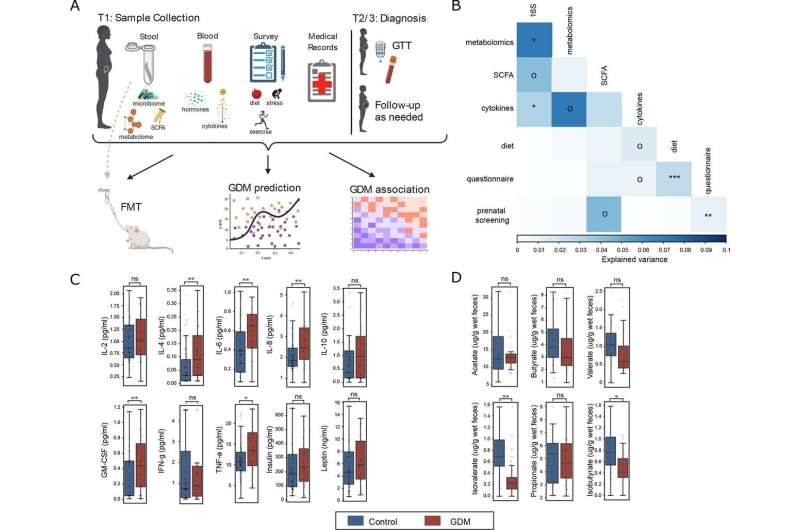This article has been reviewed according to Science X's editorial process and policies. Editors have highlighted the following attributes while ensuring the content's credibility:
fact-checked
peer-reviewed publication
trusted source
proofread
Gut microbes can help diagnose gestational diabetes as early as the first trimester of pregnancy

A new Bar-Ilan University study has found that gestational diabetes can be diagnosed as early as the first trimester of pregnancy—months earlier than typically detected.
Gestational diabetes mellitus (GDM) is a condition in which women without diabetes develop glucose intolerance during pregnancy. GDM, which plagues approximately 10% of pregnant women worldwide, is currently diagnosed in the second trimester of pregnancy.
The new study, led by Prof. Omry Koren, of the Azrieli Faculty of Medicine of Bar-Ilan University, and a team of Israeli and international researchers, is one of the first to show reliable prediction of GDM months before it is typically diagnosed.
There are marked differences in the first trimester gut microbiota (the bacterial population found in the guts of humans and animals) of women who do and do not later develop gestational diabetes. These differences are associated with inflammatory markers, with women who develop gestational diabetes exhibiting higher inflammation and lower levels of beneficial metabolites.
In the study fecal and serum samples were collected from pregnant women during their first trimester. The microbiota, metabolite, inflammation, and hormone profiles were characterized. Diet, smoking, and other lifestyle habits were recorded, and clinical/medical data was compiled from digital health records.
Using the results of these characterizations, combined with other collected data, Prof. Yoram Louzoun, from the Department of Mathematics and Gonda (Goldschmied) Multidisciplinary Brain Research Center, built a machine learning model that can accurately predict which women would and would not go on to develop gestational diabetes.
The researchers then demonstrated in animal models that transferring the first trimester feces of women that went on to develop gestational diabetes results in transfer of the diabetes phenotype to germ-free mice, suggesting that the gut microbiome has a role in mediating disease development. The study findings are not population specific. The microbiome model, for example, could predict GDM in Chinese women, and the mice results were replicated in Finnish and American cohorts.
"Recognition of women at risk of gestational diabetes at an early stage of pregnancy may allow specific recommendations for prevention of the disease—currently by lifestyle modification and in the future perhaps by specific pre, pro, and postbiotic supplementation," says Prof. Koren.
If gestational diabetes can be prevented, there would be a major reduction in adverse outcomes of gestational diabetes, for the mother and offspring, in both the short and long term, benefiting families worldwide.
The study was published in the journal Gut.
More information: Yishay Pinto et al, Gestational diabetes is driven by microbiota-induced inflammation months before diagnosis, Gut (2023). DOI: 10.1136/gutjnl-2022-328406



















